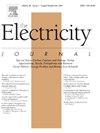风能补贴:推动长期可再生能源份额,但减缓短期进展?经合组织国家的实证研究
IF 2.2
Q1 Social Sciences
引用次数: 0
摘要
本研究考察了36个经合组织成员国的上网电价与可再生能源在电力结构中的份额之间的关系,并使用一系列面板数据估计技术对其强度进行了量化。研究结果显示,风能上网电价与可再生能源在电力结构中的份额之间存在统计学上显著的长期正相关关系,而短期内则存在负相关关系。具体来说,从长远来看,上网电价每增加1美分,可再生能源的份额就会增加0.43-0.79 %。此外,人均收入每增加1 %,可再生能源在能源结构中的份额就会增加0.07-0.14 %。然而,在短期内,上网电价每增加1美分,可再生能源在能源结构中的份额就会下降0.23% %。来自7位专家访谈的见解表明,这种违反直觉的短期关联可能是由数据驱动的,可以用可再生能源发电在商业周期扩张或繁荣阶段适应更高的上网电价所需的时间滞后来解释。本文章由计算机程序翻译,如有差异,请以英文原文为准。
Wind power subsidies: Fueling long-term renewable share but slowing short-term progress? An empirical study of OECD countries
This study examines the relationship between feed-in tariffs and the share of renewable energy in the electricity mix of 36 OECD member states, quantifying its strength using a range of panel data estimation techniques. The results reveal a statistically significant positive long-term association between feed-in tariffs for wind energy and the share of renewables in the electricity mix, contrasted by a negative association in the short term. Specifically, a one-cent increase in FiTs is associated with a 0.43–0.79 % rise in the share of renewables in the long term perspective. Additionally, a 1 % increase in per capita income corresponds to a 0.07–0.14 % increase in the share of renewables in the energy mix. However, in the short run, a one-cent increase in feed-in tariffs associates with a 0.23 % decrease in the share of renewables in the energy mix. Insights from seven expert interviews suggest that the counterintuitive short-term association is likely data-driven and may be explained by time lags required renewable electricity output to adjust to higher feed-in tariffs during expansion or boom phases of the business cycle.
求助全文
通过发布文献求助,成功后即可免费获取论文全文。
去求助
来源期刊

Electricity Journal
Business, Management and Accounting-Business and International Management
CiteScore
5.80
自引率
0.00%
发文量
95
审稿时长
31 days
期刊介绍:
The Electricity Journal is the leading journal in electric power policy. The journal deals primarily with fuel diversity and the energy mix needed for optimal energy market performance, and therefore covers the full spectrum of energy, from coal, nuclear, natural gas and oil, to renewable energy sources including hydro, solar, geothermal and wind power. Recently, the journal has been publishing in emerging areas including energy storage, microgrid strategies, dynamic pricing, cyber security, climate change, cap and trade, distributed generation, net metering, transmission and generation market dynamics. The Electricity Journal aims to bring together the most thoughtful and influential thinkers globally from across industry, practitioners, government, policymakers and academia. The Editorial Advisory Board is comprised of electric industry thought leaders who have served as regulators, consultants, litigators, and market advocates. Their collective experience helps ensure that the most relevant and thought-provoking issues are presented to our readers, and helps navigate the emerging shape and design of the electricity/energy industry.
 求助内容:
求助内容: 应助结果提醒方式:
应助结果提醒方式:


